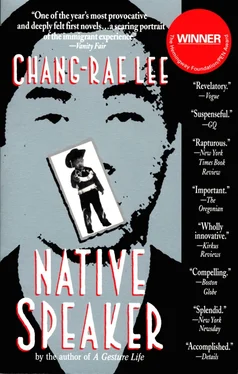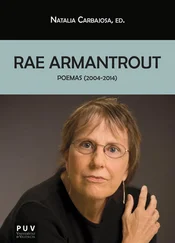Suddenly I can’t see him any longer. I can bear anything but I will not bear this. The bodies behind me respond and we push forward. I break the tape myself. I rush toward where he is and I see him at last. I fight my way. I can finally see him, three bodies deep, barely protected by the plainclothes cops, who are busy holding people and cameras back.
People are grabbing his shoulders, his hair. His bandage is torn from his head. Everyone is shouting. A hundred mouths shouting for him.
And when I reach him I strike at them. I strike at everything that shouts and calls. Everything but his face. But with every blow I land I feel another equal to it ring my own ears, my neck, the back of my head. I half welcome them. And at the very moment I fall back for good he glimpses who I am, and I see him crouch down, like a broken child, shielding from me his wide immigrant face.
This is a city of words.
We live here. In the street the shouting is in a language we hardly know. The strangest chorale. We pass by the throngs of mongers, carefully nodding and heeding the signs. Everyone sounds angry and theatrical. Completely out of time. They want you to buy something, or hawk what you have, or else shove off. The constant cry is that you belong here, or you make yourself belong, or you must go.
Most of my days begin the same. In the morning I go out in the street and I search for them. I rarely need to go far. I look for the rises of steam from pushcarts. I look for old-model vans painted in matte, their tires always bald. I look for rusty hand trucks and hasty corner displays, and then down tenement alleys strung with fancy laundry and in the half-soaped windows of basement stores. I stop in the doorways of every smoke shop and deli and grocer I can find. They are all here, the shades of skin I know, all the mouths of bad teeth, the speaking that is too loud, the cooking smells, body smells, the English, and then the phrases of English, their grunts of it to get by.
Once inside, I flip through magazines, slowly choose a piece of fruit, a candy. The store will grow quiet. The man or woman at the register is suspicious of my lingering, and then murmurs to the back, in a tone they want me to understand and in a language I won’t, to their brother or their wife. A face appears from a curtain, staring at me. I finally decide on something, put my money on the counter. I look back and the face is gone.
My father, I know, would have chased someone like me right out, stamping his broom, saying, What you do? Buy or go, buy or go!
* * *
I used to love to walk these streets of Flushing with Lelia and Mitt, bring them back here on Sunday trips during the summer. We would eat cold buckwheat noodles at a Korean restaurant near the subway station and then go browsing in the big Korean groceries, not corner vegetable stands like my father’s but real supermarkets with every kind of Asian food. Mitt always marveled at the long wall of glassed-door refrigerators stacked full with gallon jars of five kinds of kimchee, and even he noticed that if a customer took one down the space was almost immediately filled with another. The kimchee museum , he’d say, with appropriate awe. Then, Lelia would stray off to the butcher’s section, Mitt to the candies. I always went to the back, to the magazine section, and although I couldn’t read the Korean well I’d pretend anyway, just as I did when I was a boy, flipping the pages from right to left, my finger scanning vertically the way my father read. Eventually I’d hear Lelia’s voice, calling to both of us, calling the only English to be heard that day in the store, and we would meet again at the register with what we wanted, the three of us, looking like a family accident, gathering on the counter the most serendipitous pile. We got looks. Later, after he died, I’d try it again, ride the train with Lelia to the same restaurant and store, but in the end we would separately wander the aisles not looking for anything, except at the last moment, when we finally encountered each other, who was not him.
Still I love it here. I love these streets lined with big American sedans and livery cars and vans. I love the early morning storefronts opening up one by one, shopkeepers talking as they crank their awnings down. I love how the Spanish disco thumps out from windows, and how the people propped halfway out still jiggle and dance in the sill and frame. I follow the strolling Saturday families of brightly wrapped Hindus and then the black-clad Hasidim, and step into all the old churches that were once German and then Korean and are now Vietnamese. And I love the brief Queens sunlight at the end of the day, the warm lamp always reaching through the westward tops of that magnificent city.
* * *
When I am ready, I will flag a taxi and have the driver take only side streets for the three miles to John Kwang’s house, going the long way past the big mansions near the water of the Sound, where my mother once said she would like to live if we were rich enough. She wanted for us to stay in Queens, where all her friends were and she could speak her language in the street. But my father told her they wouldn’t let us live there for any amount of money. All those movie stars and bankers and rich old Italians. They’ll burn us out , he warned her, laughing, when they smell what you cook in a house .
Once, I get inside the Kwang house again. I call the realtor whose name is on the sign outside and we tour the place. As she keys the door she asks what I do and I tell her I am between jobs. She smiles. She still carefully shows me the parlor, the large country kitchen, the formal dining room, all six of the bedrooms, two of them masters. I look out to the street from the study at the top of the stairs. We go down to the basement, still equipped with office partitions. When we’re done she asks if I’m interested and I point out that she hasn’t yet mentioned who used to live in such a grand place.
Foreigners, she says. They went back to their country.
* * *
By the time I reach home again Lelia is usually finishing up with her last students. I’ll come out of the elevator and see her bidding them goodbye outside our door. She’ll kiss them if they want. They reach up with both arms and wait for her to bend down. The parent will thank her and they pass by me quickly to catch the elevator. Then she is leaning in the empty doorway, arms akimbo, almost standing in the way I would glimpse her when I left her countless times before, her figure steeled, allowing. She wouldn’t say goodbye.
Now, I am always coming back inside. We play this game in which I am her long-term guest. Permanently visiting. That she likes me okay and bears my presence, but who can know for how long? I step inside and walk to the bedroom and lie down and close my eyes. She follows me and says that this is her room. I usually sleep on the couch.
Usually? I murmur.
Yes, she says, her voice suddenly closer, hot to the ear, and she’s already on me.
After a few hours of lying around and joking and making funny sounds she’ll get up and drift off to the other end of the apartment. It’s a happy distance. She’ll prepare some lessons or read. Maybe practice in a hand mirror being the Tongue Lady, to make sure she’s doing it right for the kids.
I make whatever is easy for dinner, tonight a Korean dish of soup and steamed rice. I scoop the rice into deep bowls and ladle in broth and bring them over to where she is working. We eat by the open windows. She likes the spicy soup, but she can’t understand why I only seem to make it on the hottest, muggiest nights. It’s a practice of my mother’s, I tell her, how if you sweat and suffer a boiling soup in the heat you’ll feel that much cooler when you’re done.
I don’t know, Lelia says, wiping her brow with her sleeve. But she eats the whole thing.
Читать дальше












